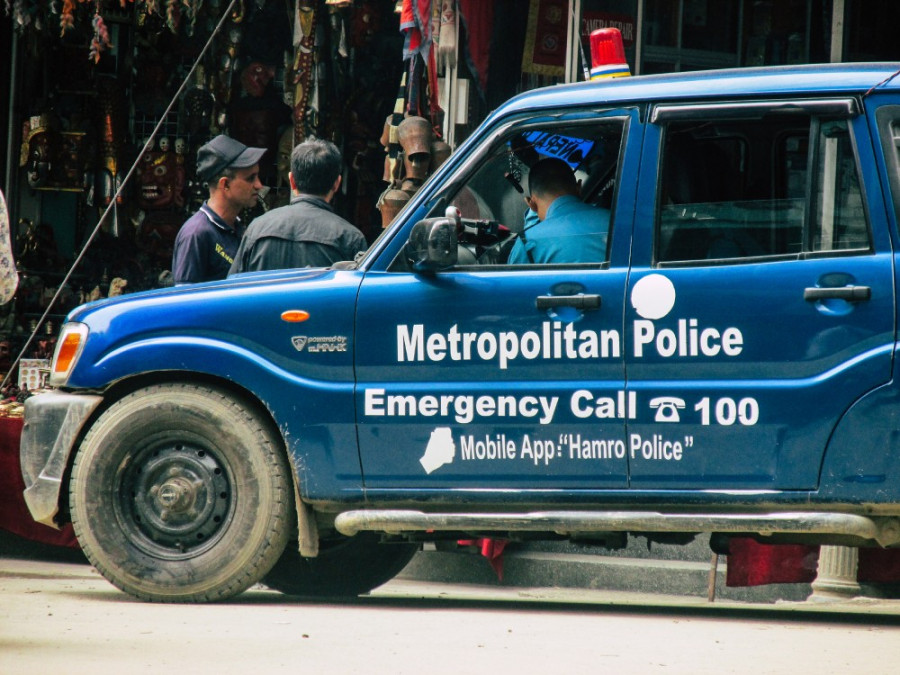Valley
Insurgency’s over but police continue to stop and interrogate people on their whereabouts
City residents say they regularly get stopped by police, particularly at night, asking why they’re out until late.
Tsering D Gurung
It was around 11pm and the streets were deserted. Nirman Shrestha and his girlfriend had just dropped off their friend at his home in Sanepa and were driving down the street connecting Sanepa to the Ring Road when they were abruptly stopped by two policemen.
“Open the window,” one of the police personnel ordered.
Shrestha duly rolled down his window.
“Switch on the light,” the officer told the couple.
“I asked him if there was any issue,” Shrestha told the Post, recounting the incident, which took place on the night of June 23. “He didn’t say anything, just took a good look inside our car.”
The police then asked the couple where they were headed and let them go, said Shrestha.
“It may seem like a minor thing but I was just so bothered by their attitude,” said 39-year-old Shrestha, who works as an independent researcher. “They stop you, and when you ask them why you are being questioned, they don’t respond.”
Shrestha’s experience is just one among many incidents of the police randomly stopping people at night and questioning them. While the majority of the people who shared their experiences with the Post said that they understand the police have a duty to maintain law and order, what they can’t come to terms with is the moral line of questioning the police often seemed to take. Many residents in the city said the police also routinely profile people based on their clothes and physical appearance.
Two weeks ago, theatre practitioner Deepesh Paudel, his wife and two friends were walking in Bhaisepati, looking for a taxi after a night shoot, when they were approached by two policemen on a motorcycle.
Paudel asked the police if there was any problem. But he did not receive a response. Instead, the police admonished the family for wandering around late at night, according to Paudel.
“Although they were polite, they kept saying things like, ‘it’s already late’, ‘you shouldn’t be out at this time of the night,’ and that’s what made me feel uneasy,” said Paudel. “I understand it’s their duty to patrol at night but what right do they have to dictate when people should or should not be out on the streets?”
For Paudel, this was not the first time he had been reproached by police personnel for being out late at night. In a previous incident, he said he had been chatting with a friend right outside his home in Siphal when police personnel patrolling the neighbourhood told him to go home.
“Does our law state that we can’t be out at night after 10pm?” Paudel said.
But Nepal Police has a different story. Officials say they often stop individuals at night because they’re simply trying to find out if they need any help or assistance.
“We believe in offering 24-hour protection, so it’s not just about being on the lookout for criminals. It’s also to provide help and support to those who may be in need,” said Superintendent of Police Ramesh Thapa. “For example, we often drop people home who may need a ride late at night.”
But none of the individuals who spoke to the Post said that they felt the police were trying to help them.
“The way they question you, they make you feel like you’ve committed some sort of crime,” said Shrestha.
Paudel, who has shoulder-length hair and keeps a beard, said he often felt he was stopped for questioning due to his appearance.
“If you have long hair or long beard, then they tend to question you more,” said Paudel. “And this is true for both traffic and police personnel.”
Namita Kandel, an educator, said she was taken aback when she was stopped by police personnel manning the check post in Jawalakhel in March last year. She was returning home to Kusunti from a dance party.
“It just made feel very odd. There were other people on the street as well. But they weren’t questioned,” said Kandel. “I think they stopped me because I was wearing a party outfit.”
SP Thapa, however, said that his department does not have any policy in place that states citizens can’t walk around at night.
“These stops are just part of regular policing measures to ensure the security situation of the country is maintained,” he said. “The police are not stopping and questioning people with the intention of harassing them.”
According to Thapa, it’s “normal” police practice to ask an individual walking around at night about their whereabouts. But if anyone feels they have been harassed by police personnel, they can file complaints, said Thapa.
“There’s designated personnel at every police station whose job is to register complaints,” said Thapa. “Once the complaint has been filed, action will be taken accordingly as per provisions in the police regulations.”
But even those who have sought to take their complaints to senior police personnel said they didn’t have much luck.
Shrestha, who once had an argument with a police constable, said he ended up behind bars when he tried to tell the Deputy Superintendent of Police at the local station what happened. It was only after his father showed up at the station after placing a call to the Inspector General that he was released.
“It kind of feels like we are living in a police state where the police are above the law and they can get away with doing anything they want,” said Shrestha. “Like they are first class citizens and we are second class.”




 22.64°C Kathmandu
22.64°C Kathmandu












